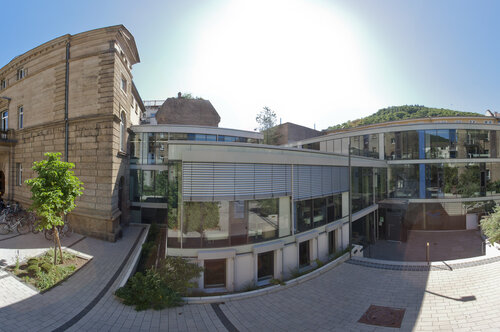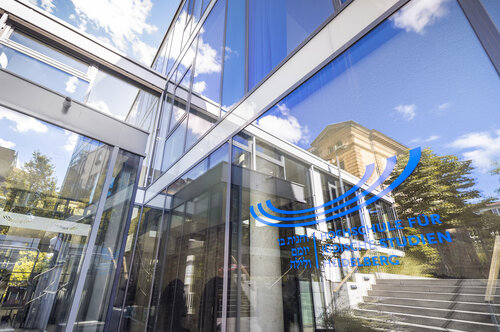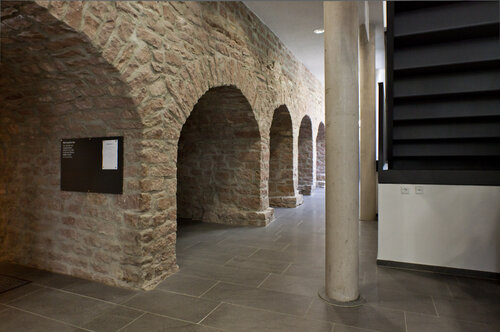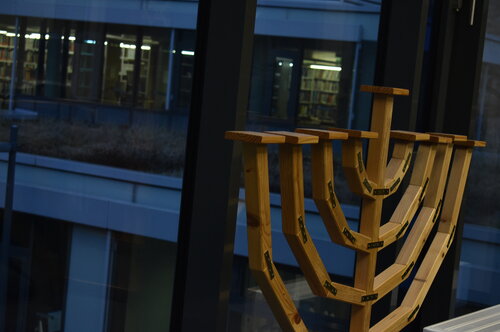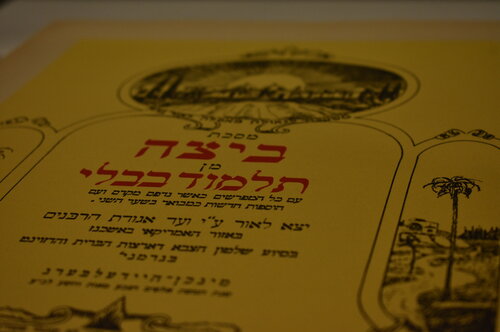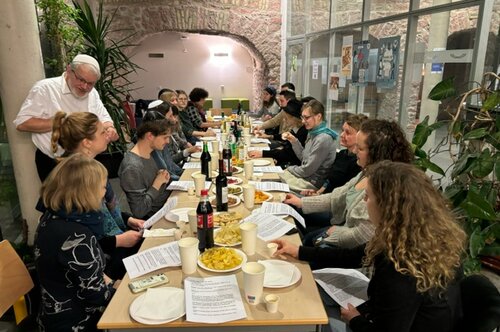M.A. Middle Eastern Studies
The most important Facts in brief
-
Degree M. A. Middle Eastern Studies
-
Start of the Studies Winter Semester
-
Language Requirement Hebrew and Arabic or Turkish/Ottoman or Farsi
-
Course Language German / English
-
Further Study Locations Heidelberg University
-
Language Acquisition Learning and consolidating Hebrew and Arabic or Turkish/Ottoman or Farsi
-
Standard Period of Study 4 Semester
-
Cooperation with Heidelberg University
-
Deadline for Applications 15.6.
The transdisciplinary Master's degree program "Middle Eastern Studies" is a joint-degree program of the Ruprecht-Karls-Universität Heidelberg and the Hochschule für Jüdische Studien Heidelberg. It uniquely combines different disciplines that deal with the culturally and religiously multifaceted region of the Middle East and opens up new and diverse perspectives on the history and present of the Middle East through its special combination of social science and historical methods.
The professorships of Islamic Studies at the Department of Near Eastern Languages and Cultures and the Ben-Gurion Endowed Chair for Israel and Middle Eastern Studies as well as other Judaic subjects are involved. Students on the course are enrolled at both participating institutions and thus also benefit from the combination of two special academic environments that only exist in this combination in Heidelberg.
The Middle East is characterized by cultural, linguistic and religious diversity. The Heidelberg Master's degree program in Middle Eastern Studies brings together the various disciplines that deal with this multifaceted region: Islamic Studies, Jewish Studies, Israel Studies, History and Social Science Middle Eastern Studies. The languages of the region form the basis for a cross-cultural approach, in particular through the combination of modern Hebrew and another Middle Eastern language (Turkish, Arabic, Persian).
Aim of the Degree Program
The degree program thus offers students from Germany and abroad the opportunity to incorporate their previous specialist studies (Islamic Studies, Jewish Studies, Middle Eastern Studies) and gain further interdisciplinary qualifications in the field of Middle Eastern Studies. Students take the two equally weighted specializations "Jewish Middle East" and "Islamic Middle East", which offer numerous opportunities for individual profile development. As part of the intensive language training, they learn modern Hebrew as well as Arabic, Turkish or Persian and deepen their knowledge of humanities and social science methods. In courses based on current research at the participating institutions, students acquire a comprehensive and differentiated education in regional studies and are given extensive opportunities for further academic qualification.
Through this combination of different academic approaches, the degree program enables its graduates to explore both modern problem areas of the Middle East and their historical development from more than one perspective. Students on the Heidelberg Middle East Master's degree program benefit from individual supervision, a broad range of courses and a unique combination of subjects including Islamic Studies, Jewish Studies and Israel Studies. Heidelberg University's special range of subjects (for example in the fields of ancient studies, cultural studies and Asian studies) enables students to develop and pursue their own interests. In addition, the participating institutions have partnerships and contacts for arranging study-related stays abroad.
- A degree with an above-average grade (overall grade at least 2.3) in one of the subjects "Islamic Studies" and/or "Jewish Studies" or a subject with largely the same content.
- Reading knowledge of English at least B2
- Depending on the first specialization (see below), reading knowledge of at least C1 in one of the following languages Hebrew, Arabic, Turkish/Ottoman, Persian
The modular structure of the Master's degree course in Middle Eastern Studies consists of the two equally weighted specializations "Jewish Middle East" and "Islamic Middle East". In specialization 1, you will deepen and expand the knowledge gained from your BA studies from the special perspective of the degree program. In the second specialization, you will be introduced to the area not yet covered in the B.A. degree course. Here you will acquire basic knowledge in one of the source languages of the specialization.
Regardless of your area of specialization, you will attend the joint module NOS 1 "Basic Methodological Module" together with the other students on the course in the first and second semesters, which relates the areas of specialization to each other through its courses and focuses on transdisciplinary issues and problem complexes. After a course-specific introductory lecture in the first semester ("Introduction to Middle Eastern Studies"), you will take part in a colloquium in the second semester, which links the transdisciplinary course with the subject-specific courses and thus opens up a broad and lively discussion forum for methodological and content-related issues.
Students with a B.A. degree in "Jewish Studies" or similar.
If you have a B.A. degree in "Jewish Studies" or in a subject with largely the same content, you will have your first specialization in the area of "Jewish Middle East" and your second specialization in the area of "Islamic Middle East".
In the first specialization "Jewish Middle East", you will complete three modules (NOS 2a, 3a and 4a), each of which combines language and content components. You will continue your study of Modern Hebrew in the NOS 2a and 3a modules as part of two consecutive language courses (Modern Hebrew V and VI), in which you will further differentiate and expand the language skills you acquired during your B.A. studies. In the NOS 4a module, you will apply this knowledge as part of a source exercise based on current research. Parallel to the language courses, you will attend a research-oriented advanced seminar in each of the first two semesters, which is based primarily on the study of original Hebrew-language sources and deals thematically with exemplary problem complexes of the degree program from a transdisciplinary perspective. In Module 4a, you will also take part in an exercise based on current research projects which, in combination with the above-mentioned reading course, teaches, deepens and expands practical research skills. On request, you can replace parts of the NOS 4a module with an external internship.
In the second specialization (Islamic Middle East, consisting of 4 modules (NOS 5b to 8b), you will learn one of the languages Arabic, Turkish/Ottoman or Persian in modules NOS 5b and 6b. You will complete the three-semester undergraduate language course in the third semester by attending a language-related exercise (reading, conversation, historical language level, etc.).
At the same time, you will be gradually introduced to the working methods and problem areas of Islamic Studies and to exemplary research questions. You will also practise working with "Islamic-language" source material. After an overview lecture "Islamic Middle East" (NOS 7b) in the first semester, you will attend the course "Approaches and Problems of Islamic Studies", which focuses on transdisciplinary issues in the sense of the degree program. In the third semester (NOS 8b), you will acquire initial research-oriented skills as part of an advanced seminar.
You will take your examinations in the fourth semester. After taking the final oral examination in the second specialization, you will write your Master's thesis in the first specialization during the fourth semester, the topic of which should be transdisciplinary in the sense of the degree program. A subject representative from the second specialization acts as a second assessor.
Students with a B.A. degree in "Islamic Studies" or similar.
If you have a B.A. degree in "Islamic Studies" or in a subject with largely the same content, you will have your first specialization in "Islamic Middle East" and your second specialization in "Jewish Middle East".
In the first specialization "Islamic Middle East", you will attend three modules (NOS 2b, 3b and 4b), which combine language and content components. The specialization focuses primarily on deepening and expanding the language skills acquired in the B.A. degree course and on deepening practical research skills with a focus on dealing with "Islamic-language" source texts. You will attend two advanced seminars (NOS 2b and 3b) in the first and second semesters, in which exemplary topics based on current research projects are dealt with from a transdisciplinary perspective. In the second semester (NOS 3b), you will also attend a reading course accompanying the advanced seminar, in which source-language material on the topic of the course is jointly developed, read, translated and methodically discussed. In the third semester (module NOS 4b), you will attend a practical research-oriented source-language reading course in combination with a freely selectable exercise, also oriented towards current research questions, in order to further practice and deepen the differentiated independent handling of "Islamic-language" source texts and thus prepare for writing your final thesis. On request, you can replace parts of this module with an external internship.
In the second specialization (Jewish Middle East, consisting of 4 modules (NOS 5a to 8a)), you will learn modern Hebrew as part of an intensive two-semester course (module NOS 5a) and gain insights into other, historical varieties of Hebrew (module NOS 6a: Biblical Hebrew and Rabbinic Hebrew) from the second semester onwards.
At the same time, you will be gradually introduced to the working methods and problem areas of the subject "Jewish Studies" and to exemplary research questions. You will also practise working with Hebrew-language source material. After attending the lecture series "Introduction to Jewish Studies" (NOS 7a) in the first semester, you will attend the course "Approaches and Problems of Jewish Studies" in the same module in the following semester, in which transdisciplinary issues in the sense of the degree program will be addressed. In the third semester (NOS 8a), you will acquire initial research-oriented skills as part of an advanced seminar.
You will take the Master's examinations in the fourth semester. After taking the final oral examination in the second specialization, you will write your Master's thesis in the first specialization during the fourth semester, the topic of which should be transdisciplinary in the sense of the degree program. A subject representative from the second specialization acts as a second assessor.
Students with a B.A. degree in "Islamic Studies" or similar.
Students with a B.A. degree in both Islamic Studies and Jewish Studies decide at the beginning of their studies which of the two subjects they would like to continue with as their first specialization. Within the second specialization, they then benefit from a program with numerous options to be determined on a case-by-case basis.
The Master's thesis is completed in the fourth semester and is approximately 70-80 pages long.
In addition to the qualification for academic work (e.g. as part of a doctorate), the Master's degree prepares students for a broad professional field in which analytical skills, reflective cultural knowledge and, last but not least, advanced language skills are required.
The Master's degree therefore opens up the possibility of taking on managerial and creative tasks in subject-related areas that deal with the politics, culture and society of the Middle East. Typical professional fields for Master's graduates are, for example
- International and supranational organizations
- Non-governmental organizations, humanitarian organizations
- Public service and security agencies
- Media professions
- Cultural institutions
- Foreign trade
- Political and economic consulting
- Intercultural communication
- Integration work and interreligious dialog
- Language teaching
- Adult education
Application
To apply for this Master's program (Middle Eastern Studies), you must submit your documents online. To do this, create an account on the university's new digital platform (HeiCO) and follow the instructions. https://heico.uni-heidelberg.de/heiCO/ee/ui/ca2/app/desktop/#/login






